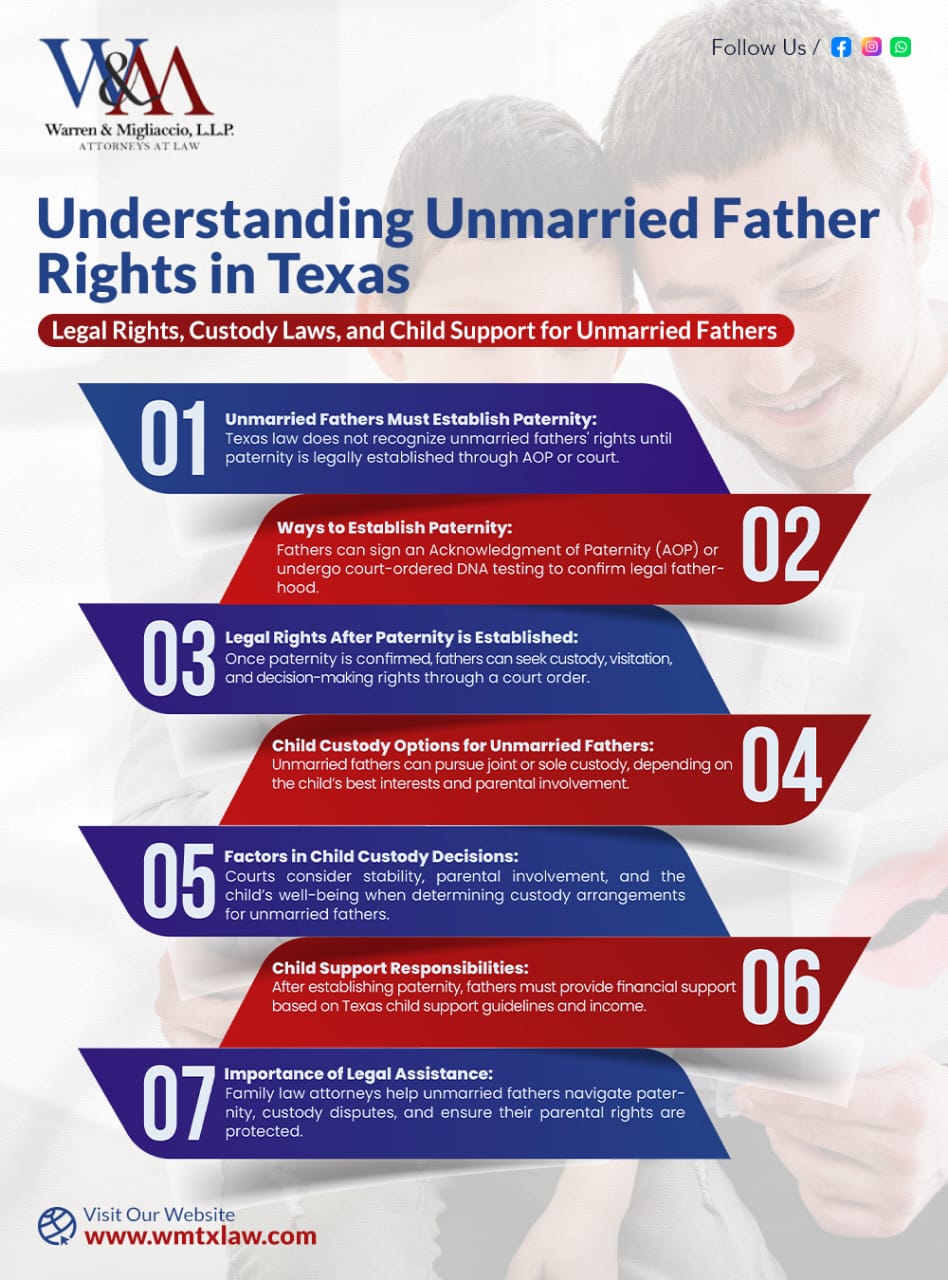If you’re an unmarried father in Texas, you must understand your rights, especially about child custody laws. The state does not automatically recognize your parental rights. You must establish paternity first. This article explains all about unmarried father rights in Texas. Its major focus will be on how to prove paternity, the legal steps to get custody, and how to protect your bond with your child.
Quick Facts
- Unmarried fathers in Texas must establish paternity to gain legal parental rights. It is because they don’t have those rights automatically like married fathers.
- Unmarried fathers can pursue custody rights after establishing paternity through a Suit Affecting Parent-Child Relationship. This allows them to make decisions about the child’s upbringing, including education.
- Get legal advice for unmarried fathers to understand paternity rights and custody disputes. Expert guidance helps ensure their rights and responsibilities are recognized and enforced.
What is an Unmarried Father in Texas
An unmarried father in Texas is a man who is not married to the child’s mother at birth. This matters because unmarried couples do not automatically have parental rights. In Texas, the child’s mother has full legal and physical custody until the father proves paternity. Even if his name is on the birth certificate, he has limited rights without legal recognition.
To gain parental rights, a father must establish paternity. Without this, he cannot make decisions about the child’s education, medical care, or upbringing.
Unmarried parents share some rights with married parents, but paternity must be established first. Some fathers qualify for presumed paternity if they meet certain conditions. If not, they must take extra steps to gain legal recognition.
Understanding these details is crucial for unmarried fathers who want custody rights.
Initial Custody Rights of Unmarried Parents
In Texas, when unmarried parents have a child, the mother automatically gets physical and legal custody. She makes key decisions about the child’s life, including education, healthcare, and where they live. An unmarried father must establish paternity to gain equal parental rights. He can do this by signing an Acknowledgment of Paternity or obtaining a court order. Without legal recognition, he has no custody or visitation rights.

Judges in Texas prioritize the child’s best interests. But if paternity isn’t established, courts usually favor the mother in custody cases. This makes it harder for unmarried fathers to secure child custody rights under Texas law.
After establishing paternity, fathers can seek joint custody or another arrangement. This allows them to be involved in their child’s life and important decisions.
Establishing Paternity: The Key to Parental Rights
For unmarried fathers, legal rights and responsibilities depend on paternity. Without it, they don’t have legal recognition for custody, visitation, and child support. Till paternity is confirmed, an unmarried father has no rights in these areas.
To gain parental rights, an unmarried father must establish paternity. He can achieve this through an Acknowledgment of Paternity (AOP) or a court process. This legal step ensures the father can protect his rights and meet his obligations to the child.
Get legal advice to understand the impact of establishing paternity. It’s necessary to secure parental rights.
Acknowledgment of Paternity (AOP) Process
The AOP process allows unmarried fathers to voluntarily establish paternity. It helps them secure legal rights to their child. A father can sign an AOP form at the hospital when the child is born or later through official channels. This legal document, also called an acknowledgment of paternity, requires both parents to sign. It declares the man as the child’s legal father.
A paternity attorney can help with the AOP process. Once signed, the father’s name is added to the birth certificate, strengthening his legal recognition. This step is crucial for making major decisions, securing custody or visitation rights, and staying involved in the child’s life.
Below table outlines the differences between Acknowledgment of Paternity and Court-Ordered Paternity Testing. It explains their process, legal requirements, costs, and recognition.
| Category | Acknowledgment of Paternity (AOP) | Court-Ordered Paternity Testing |
|---|---|---|
| How Established | Voluntary signing of AOP form | Genetic testing ordered by the court |
| Requires Mother’s Agreement | Yes | Not necessarily |
| Timeline | Can be done at birth or anytime later | Set by court |
| Cost | Usually minimal or no fee | May involve costs for DNA testing |
| Legal Recognition | Immediate once signed | After court confirms test results |
Court-Ordered Paternity Testing
If paternity is in question, unmarried fathers can request court-ordered testing. In a dispute, the court may require genetic testing. This usually involves a DNA test using cheek swabs from the father, mother, and child.
DNA testing must be done in an accredited lab. Self-testing is not allowed in Texas courts. Once the results confirm paternity, the court issues an order recognizing the father as the child’s legal father. This process, known as adjudicating parentage, is crucial for unmarried fathers seeking custody, visitation, or child support rights.
The Role of a Birth Certificate in Establishing Paternity
In Texas, a birth certificate plays a key role in paternity cases. When a child is born, the mother automatically gets physical and legal custody. The father’s name on the birth certificate does not automatically establish paternity.
However, if the father’s name is listed, it can serve as evidence in a paternity case. To officially establish paternity, the father must sign an Acknowledgment of Paternity (AOP) form. Hospitals and the Texas Department of State Health Services provide this form. Both parents must sign it and file it with the Texas Vital Statistics Unit.
Once filed, paternity is legally established. The father then gains the same rights and responsibilities as a married father.
Legal Rights After Paternity is Established
Unmarried fathers gain major rights regarding the child after establishing paternity. One important step is filing a Suit Affecting Parent-Child Relationship (SAPCR). This legal action lets fathers ask for custody or visitation based on the child’s needs.
With legal paternity, fathers can take part in raising the child, including making important decisions about education and medical care. Fathers who stay involved and supportive often have a better chance of receiving favorable custody outcomes.
Visitation schedules created through a SAPCR are binding. They allow fathers to protect their visitation rights. If paternity is never established, fathers may lack any standing in the child’s upbringing. Therefore, confirming paternity is the first step for fathers who want an active role in their child’s life.

Types of Child Custody Available to Unmarried Fathers
In Texas, unmarried fathers can pursue different custody types under the state’s custody laws. Two common options include:
Joint Managing Conservatorship: Both parents share rights and responsibilities, making big decisions together.
Sole Managing Conservatorship (Sole Custody): One parent has primary custody and the authority to make major decisions.
Physical custody describes where the child lives, while legal custody refers to who has decision-making authority for the child. Showing you can provide a stable environment can improve your custody claim. It’s vital for fathers seeking child custody rights to know these distinctions.
This table outlines the different types of conservatorship in child custody cases, explaining the roles and responsibilities of each.
| Custody Type | Description |
|---|---|
| Joint Managing Conservatorship | Both parents share legal and physical responsibilities for the child, often creating a parenting plan |
| Sole Managing Conservatorship | One parent has sole custody with the power to make major decisions for the child |
| Possessory Conservatorship | The other parent may have visitation rights or partial custody, depending on the court’s decision |
Factors Considered in Child Custody Decisions
In Texas, child custody prioritizes the best interests of the child. The court considers several factors when making a custody decision, including:
The child’s age and needs
The child’s relationship with each parent
The child’s physical and emotional well-being
The parents’ ability to provide a stable and loving environment
The parents’ willingness to cooperate and communicate with each other
The geographic distance between the parents’ residences
The child’s preference, if the child is old enough to express a preference
The court’s primary concern is the child’s well-being and safety. Therefore, the court will make a decision that is in the child’s best interests.
Related: Can a Father Get Full Custody of a Newborn?
Navigating Custody and Visitation Arrangements
Figuring out custody and visitation can be tricky, but understanding how Texas courts work and knowing your child custody rights can help. Courts decide based on what’s best for the child’s emotional, physical, and financial well-being. If you and the child’s other parent can communicate well and reach friendly agreements, you’ll likely avoid long legal battles.
Visitation is the time a non-custodial parent spends with their child, and it can be supervised or unsupervised. The court approves visitation only if it benefits the child. Texas courts often use a standard possession order, but parents can agree on changes that better meet the child’s needs. Working together usually leads to a better outcome for everyone involved.
Child Support Obligations for Unmarried Fathers
When paternity is legally recognized, an unmarried father must meet certain financial support requirements, also known as child support, as part of his legal right and responsibility. In Texas, these child support orders follow state guidelines, often enforced by the Office of the Attorney General. Both parents share the responsibility to provide for the child’s well-being.

Financial support is key to a child’s development. Both parents are expected to split the costs of care. Unmarried fathers should understand the rules so they can prepare for their child support obligations.
Calculating Child Support in Texas
In Texas, child support is calculated based on the income of both parents and the number of children involved. The court uses a formula to calculate child support, which takes into account the following factors:
The net resources of the obligor (the parent who pays child support)
The number of children involved
The amount of time the child spends with each parent
The child’s needs and expenses
The court may also consider other factors, such as the parents’ income, expenses, and debt, when calculating child support. The goal of child support is to ensure that the child’s needs are met and that the child receives the financial support they need to thrive.
Importance of Legal Assistance for Unmarried Fathers
A family law attorney can help unmarried fathers understand their rights and duties under child custody laws. Unmarried fathers often face challenges in securing parental rights. Legal advice is the best way to protect their interests.
With legal help, fathers can handle custody cases in a better way. This improves their chances of a favorable outcome. Professional support is crucial when seeking a court order. It helps establish paternity or resolve custody issues.
Finding Help in North Texas
Dallas child custody attorneys offer one-on-one support for families in custody disputes. Our firm helps parents across North Texas, including Collin, Dallas, Denton, Rockwall, and Tarrant counties.
Statute of Limitations for Establishing Paternity
In Texas, there is a statute of limitations for establishing paternity. If there is no presumed father, there is no time limit on when an unmarried father can establish paternity. However, if there is a presumed father, the unmarried father must challenge paternity within four years of the child’s birth. There are two exceptions to the statute of limitations when there is a presumed father:
If the presumed father was led to believe that the child was his
If the mother did not engage in sexual activity or live with the presumed father at the time of the child’s conception
If the unmarried father fails to establish paternity within the statute of limitations, he may lose his rights to custody, visitation, and child support.
Key Data on Unmarried Fathers in Texas
Below are some statistics showing how paternity and custody issues impact unmarried fathers. They highlight why understanding the legal process matters so much:
According to the Texas Office of the Attorney General, there are about 1.6 million child support cases open in Texas each year. This shows how crucial it is to establish paternity.
A 2019 report from the National Center for Health Statistics states that children with actively involved fathers are 39% more likely to earn mostly A’s in school.
Data from the U.S. Census Bureau notes that over 17 million children live in father-absent homes, stressing the need for paternal engagement.
Real-World Case Example (Hypothetical)
Hypothetical Case Example: Paternity and Custody Dispute
A few years ago, I helped a client who found out he was the biological father of a child only after the child was born and had turned two. The mother hadn’t put his name on the birth certificate, so he needed to file a paternity suit and go through genetic testing with the Texas courts. Once the test results confirmed he was the child’s father, we were able to set up a visitation schedule that worked for everyone. This allowed him to be involved in his child’s life. By using the legal system, he secured joint managing conservatorship. This allowed him to make key decisions about his child’s education and medical care. His case highlights the importance of being proactive. Seeking legal advice and establishing paternity helps unmarried fathers stay involved in their child’s life.
Short Illustrative Anecdote (Hypothetical)
A Father’s Experience Gaining Custody
I once worked with a dad who was totally lost when it came to figuring out his rights as an unmarried father. The child’s mom automatically had custody, which made things even more confusing for him. When we first met, he was swamped with paperwork and baffled by all the legal jargon. But he was determined to be a part of his child’s life, so we went through each document together, step by step.
He made sure to follow all the rules for the paternity suit, like filling out the right forms and getting the DNA test done on time. By showing the court he could take care of his child, he was able to get a standard possession order. This meant he could spend time with his child and start building a strong bond.
When he finally got to use his newly established parental rights, the relief and joy he felt were clear. It really showed how crucial it is for unmarried fathers to establish paternity early on. That way, they can be active in their child’s life and enjoy those special moments.

Frequently Asked Questions
FAQs Regarding: Custody and Paternity
What are the initial custody rights of unmarried mothers in Texas?
In Texas, when a child is born, unmarried mothers automatically receive physical and legal custody. This means they have the primary say in how the child is raised. For fathers to gain custody or visitation rights, they must first establish paternity.
Is Texas a “mother state” or “father state”?
Texas law focuses on the child’s best interests, not on favoring one parent. However, until a father legally establishes paternity, unmarried mothers have an early advantage.
How can an unmarried father establish paternity in Texas?
He can sign an Acknowledgment of Paternity (AOP) form or pursue a court-ordered DNA test. This step is crucial for gaining legal rights like custody.
Can a mother refuse to put the father on the child’s birth certificate in Texas?
Yes. If the parents are unmarried and haven’t signed an AOP, the father’s name may be left off the birth certificate.
Does signing the birth certificate alone give the father rights in Texas?
No. While it acknowledges fatherhood, it does not guarantee legal rights. A father must also sign an AOP or obtain a court order to gain custody or visitation rights.
What is the difference between a presumed father and an alleged father in Texas?
A presumed father is legally recognized, often because he was married to the child’s mother when the child was born. While an alleged father is someone who is claimed to be the father but has not been legally confirmed.
How much does a DNA test cost in Texas for paternity?
Costs range from $200 to $500 or more, depending on the lab. Courts require accredited lab tests and may decide how the cost is split between parents.
FAQs: Fathers’ Rights and Child Support
What legal rights do fathers gain after establishing paternity?
Once paternity is confirmed, fathers can request custody or visitation rights. They also gain the right to make major decisions about the child’s life, such as education and healthcare. Legal recognition ensures they have enforceable parental rights.
What are an unmarried father’s financial obligations?
Once paternity is established, the father is legally required to provide financial support. The Office of the Attorney General usually manages this process. However, if he is not listed on the birth certificate and hasn’t confirmed paternity, he isn’t required to pay child support right away.
What rights does a father who pays child support have in Texas?
Paying child support alone does not grant custody or visitation. A father must obtain a court order or parenting plan for these rights. With such orders, he can spend time with his child and be involved in major decision
FAQs: Legal Assistance
Why is legal assistance important for unmarried fathers navigating child custody laws?
An attorney can help with paternity establishment, custody disputes, and child support matters. Having professional legal support protects a father’s interests and ensures his parental rights are legally secured.

Conclusion on Unmarried Father Rights in Texas
Understanding unmarried father rights in Texas is key to ensuring fair treatment. It helps you in staying involved in a child’s life. This guide covers an unmarried father’s role and the legal steps to establish paternity. Confirming paternity is crucial. It provides legal recognition and allows fathers to seek custody and financial responsibilities.
Unmarried fathers should take a proactive approach. Hence, seeking legal guidance helps them protect their rights while putting their child’s best interests first. Whether through mutual agreements or legal action, they can create a supportive environment for their child.
So if you need help protecting your parental rights and securing your child’s future, our Texas child custody attorneys are here to assist you. We can guide you through the legal process and ensure you take the right steps for your family. Call us at (888) 584-9614 or contact us online to get started.

